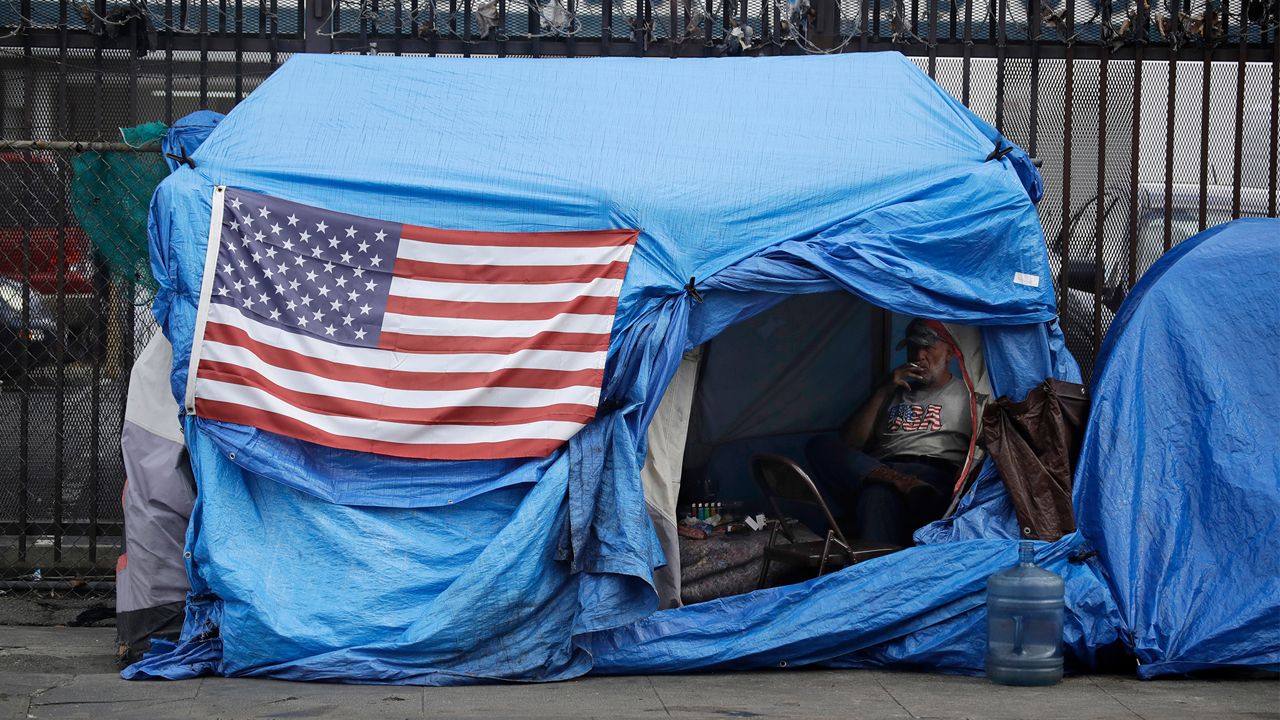LOS ANGELES — An exasperated federal judge Monday ordered a mandatory settlement conference in a long-running lawsuit demanding the city and county of Los Angeles work together to find shelter for the thousands of people camping on sidewalks and near freeways.
The judge's order came after a 90-minute court hearing via Zoom in which attorneys for the city and county indicated they have no time frame to come to a comprehensive agreement among themselves about how to successfully resolve the long-running case without going to trial.
U.S. District Judge David Carter referred several times to the "historic schism" between the city and county that has apparently stymied settlement efforts. After hearing arguments from city and county attorneys seeking to have the court dismiss the suit, Carter scheduled the mandatory conference for Feb. 15 at the downtown Los Angeles federal courthouse or another location, depending on the COVID-19 situation.
If the conference does not result in a settlement, the lawsuit would likely go to trial. Carter said he is unconvinced if a county-city agreement remains just "an aspiration." Repeating a familiar theme, the judge said he is "concerned about the inertia" on the defense side of the table.
"There has to be some kind settlement eventually," Carter said.
The lawsuit brought by the LA Alliance for Human Rights -- an association of downtown residents, homeless individuals and property owners -- has been on hold almost since the month it was filed two years ago to compel local government to "comprehensively" deal with the homelessness crisis downtown.
In November, the LA Alliance revised its complaint after an appeals court struck down an unusual court order that required the city and county to offer shelter and treatment to all unhoused people living in downtown's 50- block Skid Row within six months.
After the amended suit was filed, the county moved to have the judge toss the complaint, arguing that the plaintiffs still cannot point to any violation of law or harm traceable to Los Angeles County.
In its own dismissal motion, city attorneys contend that despite revisions, the "misguided" lawsuit violates separation of powers laws and intrudes into the city's "handling of complex policy issues" that should be addressed by elected city leaders, not a federal judge.
At Monday's hearing, the defendants briefly reiterated those positions.
Skip Miller, outside counsel for LA County, told the court that the county does not belong in the case to begin with since Skid Row is located in the city of Los Angeles, not the county.
"All we do in Skid Row is deliver services," Miller said. "Our services are extensive, they're ongoing ... we shouldn't be defending a lawsuit, we should be working arm in arm (on the homelessness problem). The money should be spent on the homeless, not on lawyers."
In addition, the LA Alliance hasn't pointed to any civil rights violations that could be blamed on the county, he said.
"They (the plaintiffs) say the county has not done enough," Miller said. "That's not a constitutional violation. We don't belong in this lawsuit as a defendant. We didn't do anything wrong. We're trying to fix the problem. ... We think the lawsuit should be dismissed."
The city argued that the LA Alliance complaint should be tossed because it fails to state claims that entitle association members to relief.
"They do not allege specific injuries to (named) plaintiffs," Scott Marcus, a Los Angeles city attorney, told the court. "This is a political lawsuit. They disagree with the way the city and county are handing a specific policy."
If LA Alliance wants to change the city's homelessness policy, "they can run for office," Marcus said.
LA Alliance attorney Elizabeth Mitchell said the impasse between the city and county reflects "continued systemic failure" in which local government is "failing in (its) statutory and constitutional obligations" to protect citizens.
The judge questioned participants about the number of homeless people in the area who perished last year either on the streets or in hospitals. Mitchell said she was told the number was 1,612 persons.
The plaintiffs' revised complaint addresses some of the procedural issues identified by the U.S. 9th Circuit Court of Appeals, such as the addition of an equal protection claim based on race, which were missing from the original filing.
The changes conform the complaint to support claims that housing failures and racism have caused and exacerbated the homelessness crisis, and that the alleged lack of action by the city and county include a discriminatory component, according to L.A. Alliance.
Those arguments are aimed at securing a second injunction against the city and county to provide shelter and treatment to the unhoused on a strict timetable, and to start regulating public spaces such as sidewalks and parks.
At nearly $1 billion, the city's budget for the homelessness problem aims to create over 5,000 additional housing units through Proposition HHH, and includes nearly $200 million for the development of affordable housing, homeless prevention, eviction defense, and other homeless services, officials said.
Last year, the L.A. Alliance applauded what it called a "massive shift" in policy in which local officials are moving toward increasing interim shelter beds, support services, and starting to clear encampments in a non- violent manner. Homeless encampments are now being cleared "humanely and compassionately," according to the association.



